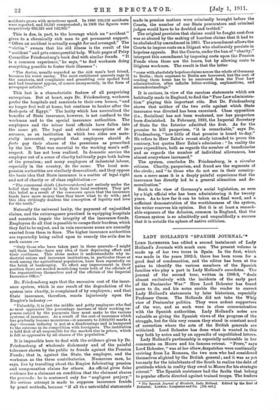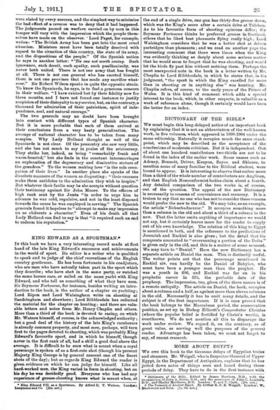LADY HOLLAND'S "SPANISH JOURNAL."*
LORD ILCHESTER has edited a second instalment of Lady' Holland's Journals with much care. The present volume is made up of her two tours in Spain: In the first, which was made in the years 1802-5, there has been room for a good deal of condensation, and the editor has been at the pains to identify the various members of the Spanish families who play a part in Lady Holland's anecdotes. The journal of the second tour, written in 1808-9, " deals almost exclusively with the incidents of the early part of the Peninsular War." Here Lord Ilchester has found more to do, and his notes enable the reader to correct Lady Holland's statements by later historians, especially Professor Oman. The Hollands did not take the Whig view of Peninsular politics. They were ardent supporters of the war, and as such were in close communication with the Spanish authorities. Lady Holland's notes are valuable as giving the Spanish views of the progress of the struggle, but for this very reason they stand in constant need of correction where the acts of the British generals are criticized. Lord Ilchester has done what is wanted in this way both by notes and by an appendix of unpublished letters.
Lady Holland's partisanship is especially noticeable in her comments on Moore and his famous retreat. "Frere," says Lord Ilchester, " was at her elbow, despatches were continually arriving from La Romana, the two men who had considered themselves slighted by the British general ; and it was as yet too early for the inhabitants of the South to realize the debt of gratitude which in reality they owed to Moore for his strategic retreat." The Spanish resistance had the faults that belong to popular efforts directed against trained troops. The leaders
• The Spanish Journal of Elizabeth, Lady Holland. Edited by the Earl of Ilchester. London: Longman and Co. [15s. net.] were elated by every success, and the simplest way to minimize the bad effect of a reverse was to deny that it had happened- The judgments passed on warfare carried on by men in this temper will vary with the impression which the people them- selves have made on the observer. ' Lord Paget, for example, writes: "The British Army has been put into the most cruel situation. Ministers must have been totally deceived with regard to the situation of this country, the state of its army, and the dispositions of the people." Of the Spanish nation be says in another letter: °"Tie one not worth saving. Such ignorance, such deceit, such apathy, such pusillanimity, was never both united. There is not one army that has fought at all. There is not one general who has exerted himself, there is not one province that has made any sacrifice what- ever." Sir Robert Wilson speaks in quite the opposite strain. To know the Spaniards, he says, is to feel a generous concern in their welfare. "I have existed but by their fidelity now for three months, and I have not found one instance to justify suspicion of their disloyalty to my service, but, on the contrary, a thousand for admiration of their patriotism, spirit of inde- pendence, zeal, and natural courage."
The two generals may no doubt have been brought into contact with different types of Spanish character. But it is more probable that each of them arrived at their conclusions from a very hasty generalization. The average of national character has to be taken from many samples. Why Lady Holland thought so well of the Spaniards is not clear. Of the peasantry she saw very little, and she has not much to say in praise of the aristocracy. They strike her, indeed, as being " remarkably frank and warm-hearted," but she finds in the constant intermarriages an explanation of the degeneracy and diminutive stature of the grandees?' To the women making love "is the sole occu- pation of their lives." In another place she speaks of the dissolute manners of the women as disgusting : " their excesses make them antidotes to the admiration they wish to inspire." But whatever their faults may be she accepts without question their testimony against Sir John. Moore. To the officers of high rank sent by the Junta "in order to urge him to advance he was cold, repulsive, and not in the least disposed towards the cause he was employed in serving." The Spanish generals found it hopeless to " attempt to make any impression on so obdurate a character." Even of his death all that Lady Holland can find to say is that "it required such an end to redeem his reputation."















































 Previous page
Previous page